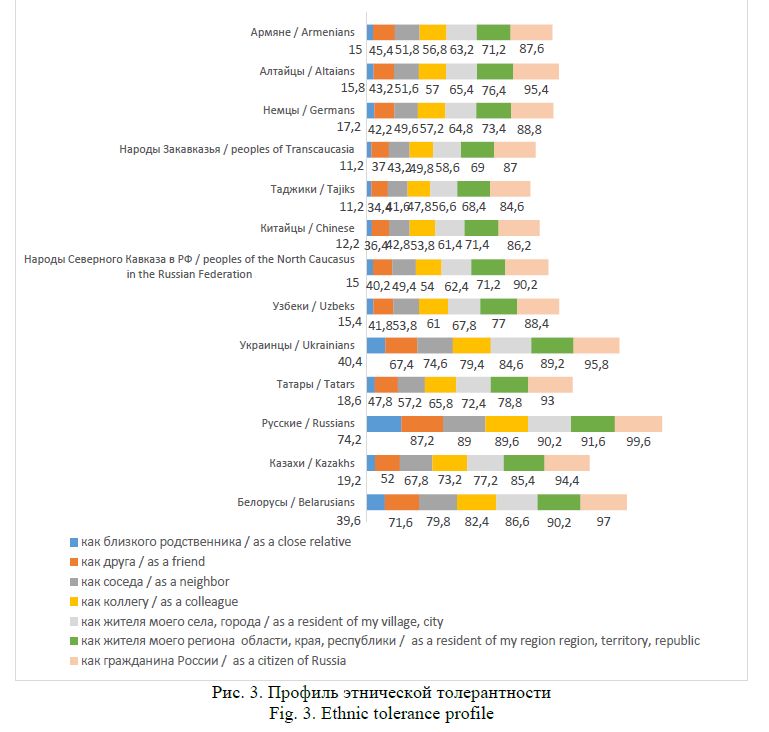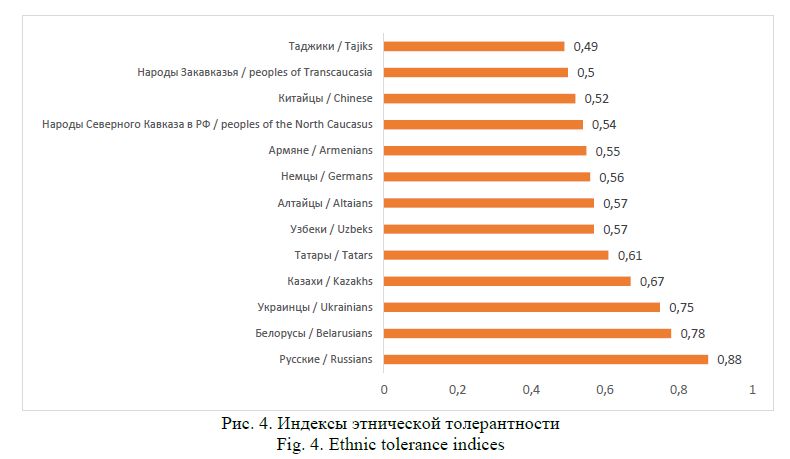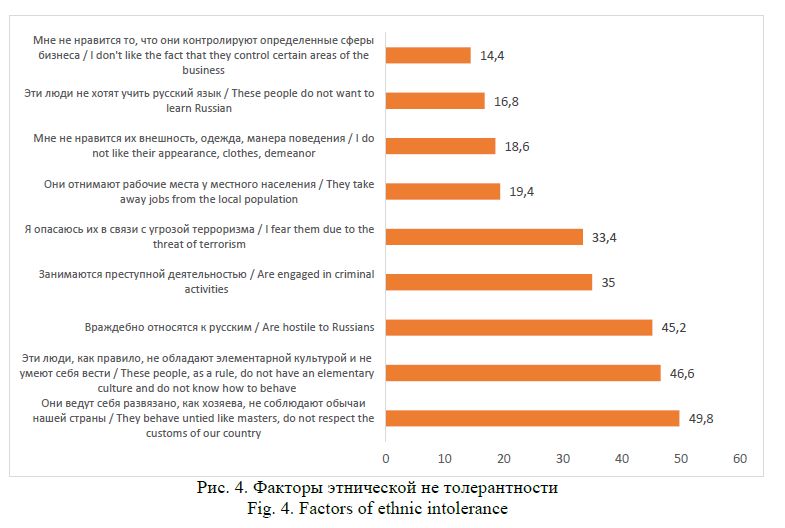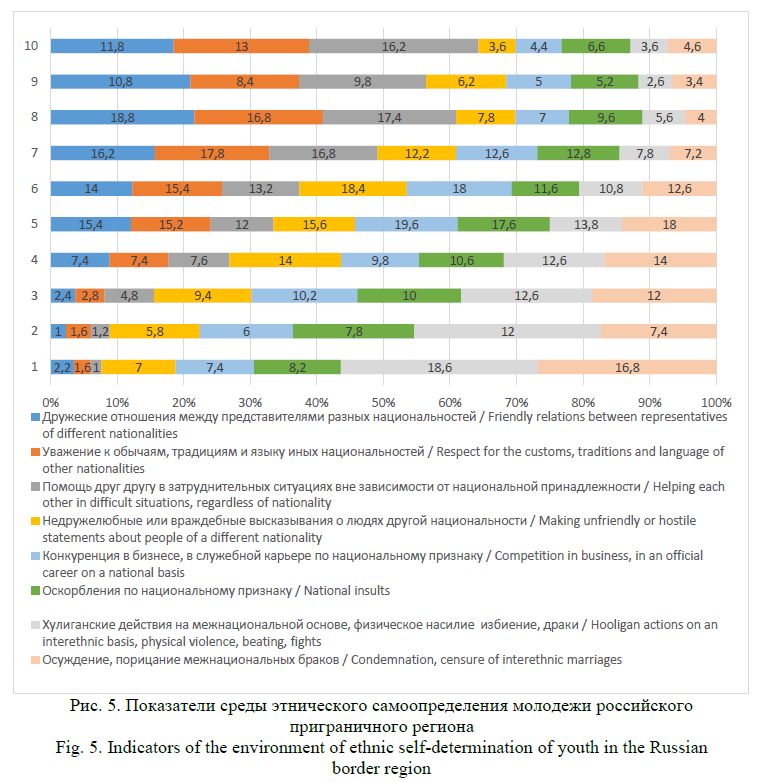Youth of the Russian borderlands: the problem of ethnic identity and tolerance
In conditions of geopolitical tension and the simultaneous striving of society to form “unlimited” tolerance, indicators of ethnic identity and ethnic tolerance are becoming the most important indicators of well-being and risk. This research agenda is especially relevant in the context of studying the younger generation as a strategically important part of the national human capital. The scientific purpose of the article is to study the factors, indicators and dispositions of ethnic identity and tolerance of young people in the Russian border region. The article proposes the results of a quantitative study of youth, within the framework of which the factor model of ethnic self-determination is determined, the typology of ethnic identity is operationalized, the profile and indices of ethnic tolerance are constructed, and the environment of youth socialization is assessed according to the criteria of its tolerant well-being. The scientific results of the discussion are conclusions about the primacy of factors of cultural integration and linguistic involvement over hereditary factors in ethnic identification; the concept of "delayed ethnic self-identification" is introduced. The risk associated with the presence of significant indicators for deviant types of ethnic identification (about 23%) is indicated and the problem of the formation of socialization trajectories of young people, leading to such socialization results, is emphasized. The author proves the existence of a value transformation that determines the change in ethnic consciousness and thinking, as well as the conflict of existing forms of youth management, youth policy and the younger generation itself - its values, attitudes and interests. Shows the role and the conflict landscape of the environment of ethnic identification of young people that exists in the Russian border region.
Figures







Shapovalova, I. S., Zavodyan, I. S. and Valieva, I. N. (2021), “Youth of the Russian borderlands: the problem of ethnic identity and tolerance”, Research Result. Sociology and management, 7 (1), 21-38, DOI: 10.18413/2408-9338-2021-7-1-0-2


















While nobody left any comments to this publication.
You can be first.
Anikina, A. V. and Shimanskaya, O. K. (2016), “National and civil identity of student youth in the mirror of sociology”, Vestnik Permskogo universiteta. Filosofiya. Psihologiya. Sociologiya, (1), 118-126. (In Russian)
Arutyunova, E. M. (2012), “Identities and ethnic attitudes of the youth of Bashkortostan”, Panorama Evrazii, (2), 39-48. (In Russian)
Arutyunova, E. M. (2017), “State-civil and ethnic identity of youth: the all-Russian context and regional specificity”, Rossiya reformiruyushchayasya, (15), 259-272. (In Russian)
Bublik, M. M. (2014), “Psychosemantic space of ethnic identity of youth”, Ph. D. Thesis, St. Petersburg, Russia. (In Russian)
Gabdrakhmanova, G. F. and Mukhametzyanova, A. R. (2016), “Ethnic identity of the Tatar youth of the Republic of Tatarstan: all-Russian, regional and cultural symbols”, Vestnik Rossijskoy nacii, (5), 102-115. (In Russian)
Gadzhigasanova, N. S. (2012), “Features of the manifestation of ethnic tolerance in the interactions of youth groups”, Abstract of Ph. D. Thesis, St. Petersburg, Russia. (In Russian)
Grishina, A. V. and Lunin, S. L. (2015), “Types of ethnic identity of Russian youth as an indicator of positive readiness to accept forced migrants from Ukraine”, Rossijskiy psihologicheskyj zhurnal, 12 (2), 46-55. (In Russian)
Gutman, E. V., Shibankova, L. A. and Zakharova, P. I. (2015) “Formation of tolerance in a multicultural educational environment”, Kazanskiy pedagogicheskiy zhurnal, (1), 57-63
Dontsov, A. I., Perelygina, E. B. and Zotova, O. Yu. (2019), “Ethnic identity of young people living in a world of risk and uncertainty”, Rossiyskiy chelovek i vlast' v kontekste radikal'nyh izmeneniy v sovremennom mire. Materialy XXI rossiyskoy nauchno-prakticheskoy konferencii, 382-384, Ekaterinburg, Russia. (In Russian)
Zhandarova, Ya. V. and Popova, N. G. (2009), “Ethnic identity and value orientations of Siberian urban youth (on the example of youth of the Surgut region of the Khanty-Mansi Autonomous Okrug-Yugra)”, Problemy istorii, filologii, kul'tury, (4), 253-258. (In Russian)
Lazareva, E. S. (2012), “Socio-cultural conditions for the formation of ethnic tolerance of student youth in the process of intercultural communication”, Ph. D. Thesis, Tambov, Russia. (In Russian)
Lugovoy, R. A. (2011), “Types of ethnic identity of young people of Dagestan in the traditional and foreign-ethnic environment”, Izvestiya Dagestanskogo gosudarstvennogo pedagogicheskogo universiteta. Psihologo-pedagogicheskie nauki, (2), 9-15. (In Russian)
Madyukova, S. A., Persidskaya, O. A. and Popkov, Yu. V. (2017), “National and ethnic identity of youth of ethnic groups of the Siberian republics in a comparative perspective”, Znanie. Ponimanie. Umenie, (3), 69-83. (In Russian)
Monitoring of interethnic relations and the religious situation in the regions of the Urals, Siberia and the Far East of Russia. Expert report for 2019, (2020), in Smirnova, T. B., Stepanov, V. V. and Starchenko, R. A. (eds.), KAN Publishing Center, Moscow-Omsk, Russia. (In Russian)
Polezhaev, P. L. (2019), “Ethnic identity of youth in the modern world”, Vestnik Vostochno-Sibirskoy Otkrytoy Akademii, (31), 1-6. (In Russian)
Prokazina, N. V. (2016), “Ethnic tolerance in the regional youth environment, Vestnik Povolzhskogo instituta upravleniya, (2), 114-121. (In Russian)
Russian world in a changing world (2018), in Komarova, G. A. (ed.), IEA RAN, Moscow, Russia. (In Russian)
Samsonova, E. A. and Yudina, E. Yu. (2009), “Ethnic tolerance in the minds of Tula youth”, Sotsiologicheskie Issledovaniia, (10), 66-69. (In Russian)
Sklyarova, D. V. (2008), “Features of the ethnic identity of student youth of the Kabardian, Balkarian and Russian ethnic groups”, Abstract of Ph. D. Thesis, Rostov-on-Don, Russia. (In Russian)
Khamova, S. N. (2005), “Features of managing the process of forming ethnic tolerance among students”, Ph. D. Thesis, Moscow, Russia. (In Russian)
Tselischeva, V. G. (2007), “Peculiarities of ethnic identity of young people of small peoples of the Far East region”, Sotsiologicheskie Issledovaniia, (1), 122-127. (In Russian)
Chebotareva, E. Yu. (2012), “Ethnic identity of youth in a multi-ethnic environment”, Vestnik Rossiyskogo universiteta druzhby narodov. Seriya: Psihologiya i pedagogika, (1), 22-28. (In Russian)
Shaikhislamov, R. B., Irnazarov, R. I., Sadretdinova, E. V. and Korovkina, N. V. (2013), “Civic identity: the regional dimension of globalization”, Vestnik VEGU, (3), 79-86. (In Russian)
Shapovalova, I. S. and Kisilenko, A. V. (2018), “Spiritual and moral choices in the life strategies of youth: the experience of sociological research”, Srednerusskiy vestnik obshchestvennyh nauk, 13 (6), 14-28. (In Russian)
Shapovalova, I. S. and Malikova, E. V. (2018), “Implementation of state youth policy in Russia: regional aspect”, Teoriya i praktika obshchestvennogo razvitiya, (6), 22-26. (In Russian)
Sheregi, F. E. (2010), “Ethnic and religious tolerance of youth”, Monitoring obshchestvennogo mneniya: ekonomicheskie i social'nye peremeny, (2), 21-40. (InRussian)
Program of fundamental and applied scientific research «Ethno-cultural diversity of Russian society and strengthening of all-Russian identity» 2020-2022.